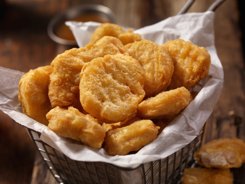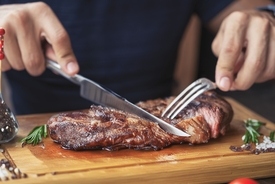A British teenager has reportedly been left clinically blind after spending years surviving off a diet of chips and crisps. The 17-year-old, who ate little else other than French fries, Pringles and white bread, developed severe malnutrition and vitamin deficiencies, which ultimately led to him losing his sight.
According to a report by the BBC, the unidentified adolescent was first taken for treatment at the age of 14, following complaints of tiredness and feeling unwell. Despite being diagnosed with a vitamin B12 deficiency and being placed on supplements by doctors, the boy did not stick with the medication programme or change his diet. The Annals of Internal Medicine journal claims that it was three years after this initial consultation that he arrived at Bristol Eye Hospital because of progressive sight loss.
According to doctor Denize Atan, who treated the teen at the hospital:
"His diet was essentially a portion of chips from the local fish and chip shop every day. He also used to snack on crisps - Pringles - and sometimes slices of white bread and occasional slices of ham, and not really any fruit and vegetables.”
He explained this as an aversion to certain textures of food that he really could not tolerate, and so chips and crisps were really the only types of food that he wanted and felt that he could eat."
Tests from Dr Atan and other medical professionals ultimately revealed that he was still low in vitamin B12, as well as copper, vitamin D and selenium. They diagnosed him with nutritional optic neuropathy, which while treatable if caught early, can cause fibres in the optic nerve to die and any damage to become permanent.
Doctors also believe that he suffered from an avoidant-restrictive food eating disorder, which ultimately led to the neuropathy diagnosis.

Though the boy still has some peripheral vision, doctors stress that he fits the medical criteria for blindness. As Dr Atan explained:
“He had lost minerals from his bone, which was really quite shocking for a boy of his age. He had blind spots right in the middle of his vision. That means he can't drive and would find it really difficult to read, watch TV or discern faces. He can walk around on his own though because he has got peripheral vision."
While cases such as this are rare, Dr Atan stresses that it serves as a warning to parents worried about picky eating. Offering advice to anyone concerned, Dr Atan states that, “It's best not to be anxious about picky eating, and instead calmly introduce one or two new foods with every meal," and he also emphasised that "Nutritional yeast is a way of adding B12 to your diet."


.jpg_fgRcK8?tr=h-184)

